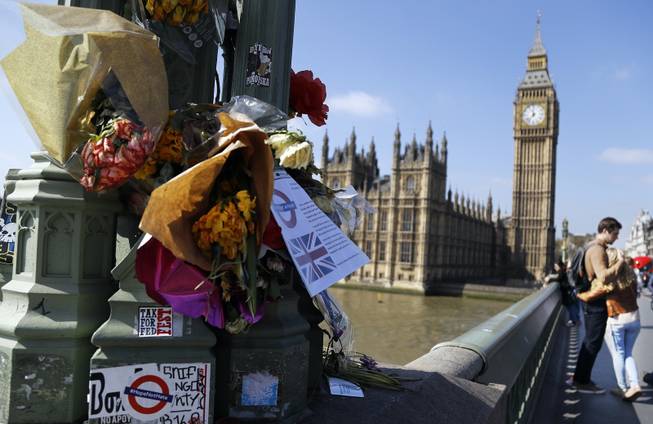
Frank Augstein / AP
Flowers are seen at Westminster bridge to remember the terror attack on March 22, in London, Friday, April 7, 2017.
Wednesday, June 14, 2017 | 2 a.m.
Security experts from across the world discussed the components of a robust tourism industry, including safety, health and enjoyment Tuesday at the International Tourism Safety Conference in Las Vegas.
“Tourism security means economic well-being, health well-being and safety well-being,” said renowned tourism security scholar Peter Tarlow.
Hosts of the 24th annual conference held at the Las Vegas Convention Center included Metro Police and the Las Vegas Convention and Visitors Authority. The event drew more than 320 participants from law enforcement and the hotel, security and tourism industries, representing 20 countries, including Israel, China, Brazil, Cuba, Switzerland and Nigeria. The two-day conference concludes today.
Tarlow is a nationally renowned Texas-based scholar and author whose tourism security projects include working with police for the 2014 World Cup in Brazil and last year’s Summer Olympic Games.
A retired rabbi and current professor at Texas A&M, Tarlow said continued media coverage of terrorist attacks in Europe have left public fear of traveling to that continent at “very high” levels.
But tourist confidence in traveling to the United States has remained strong, thanks to a lack of terrorism attacks and a perceived notion that our nation is generally a safe place to vacation.
“It’s just to Europe,” Tarlow said. “Here, traveling to and within the United States, people have more confidence.”
Also speaking Tuesday was Rio de Janeiro-based Lilian Donati and Andre Godinho, founders of security consulting firm Site da Seguranca.
Donati, whose company partners with local authorities in the Brazilian coastal city, said the need for private influence in public security is “greater than ever” and that such influence can work beneficially for a city’s tourism industry. Especially in her hometown, where debt incurred from hosting the world’s two largest international sporting events over a span of two years has left Rio de Janeiro’s government cash-strapped and unable to afford elaborate police or security camera projects.
“Everything got a lot worse — the state is completely broken,” Godinho added. “When you talk about public security, forget it. So we’re trying to promote a public-private partnership.”
The married Brazilian couple, who have both worked in the security industry for over 20 years, said international travel is difficult to promote to tourists who fear for their safety. As Rio’s crime rates continue to soar due to lack of public resources, they predicted such fears will continue to grow toward their home city.
Carole Gorney, a senior crisis management consultant with Gannett Fleming, talked about the impact of media coverage of terrorism, mass shootings and crisis events in international cities and the negative effect they have on tourism in those cities.
As media outlets continue to shrink in staff size, coverage of events becomes less precise, with reporters often posing as experts and interjecting opinion while covering events in foreign countries, she said. Such coverage creates misperceptions of reality from viewers that could in turn “deter their tourism decisions.”
Perceptions of risk in the public are greater when crisis events occur close together, Gorney added, because the negative media coverage is more constant.
“Visitors might forgive you for one event, assuming it’s safer now than it was before,” Gorney said. “But if more than one crisis happens, it’s interpreted that officials in that city are not doing their job.”
